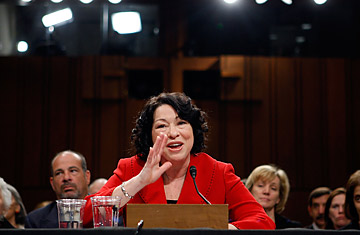
Supreme Court nominee Judge Sonia Sotomayor answers questions from the Senate Judiciary Committee during the second day of her confirmation hearings on Capitol Hill
(2 of 2)
Senator Dianne Feinstein, a California Democrat, marveled at Sotomayor's refusal to be ruffled. "I must say that, if there's a test for judicial temperament, you pass it with an A-plus-plus," Feinstein said to laughs from the crowd. "I want you to know that, because I wanted to respond, and my adrenaline was moving along. And you have just sat there, very quietly, and responded to questions that, in their very nature, are quite provocative. So I want to congratulate you about that."
The Democratic senators — who outnumber their minority colleagues 12-7 — spent much of the day alternatively praising Sotomayor and attacking the Roberts-led court. In fact, Roberts was mentioned more often (16 times) than empathy (10 mentions), which Republicans tried over and over again to use as a line of attack against the nominee. Feinstein, for her part, spent much of her 30-minute Q&A with Sotomayor mulling over the court's recent upholding of a ban on partial-birth abortion — in her view bypassing the Roe v. Wade precedent. "I'd also like to ask you your thoughts on how a precedent should be overruled," Feinstein said. "In a rare rebuke of his colleagues, Justice Scalia has sharply criticized Chief Justice Roberts and Justice Alito for effectively overruling the court's precedents without acknowledging that they were doing so." Pausing between each carefully chosen word, Sotomayor responded that, while there are times when precedent should be reexamined, those should be done "very, very cautiously."
Schumer spent the bulk of his time working to dispel the Republican notion of Sotomayor as ruled by passion more than the law. He went through some of Sotomayor's most tragic cases to underline instances where she applied the rule of law even when the decision went against those who had clearly suffered. "You heard the case of families of the 213 victims of the tragic TWA crash," Schumer said. "The relatives of the victims sued manufacturers of the airplane, which spontaneously combusted in midair, in order to get some modicum of relief, though, of course, nothing a court could do would make up for the loss of the loved ones. Did you have sympathy for those families?"
"All of America did," Sotomayor replied.
"But ultimately, you ruled against them, didn't you?" Schumer asked, knowing her answer would be yes.
Perhaps the harshest line of questioning came from Graham, who, citing unnamed sources in a lawyer's almanac, alleged that Sotomayor had a reputation for being temperamental. "Here's what they said about you: 'She's a terror on the bench. She's temperamental, excitable, she seems angry. She's overall aggressive, not very judicial. She does not have a very good temperament. She abuses lawyers.'" Graham recounted. "When you look at the evaluation of the judges on the Second Circuit, you stand out like a sore thumb in terms of your temperament. What is your answer to these criticisms?"
"I believe that my reputation is that I ask the hard questions, but I do it evenly for both sides," Sotomayor answered back, maintaining her calm, as ever, in the face of a line of questioning that some observers called patronizing.
Most lawyers know well Aristotle's famous phrase: The law is reason free from passion. This is the crux of the debate about what kind of Supreme Court Justice Sonia Sotomayor would make: that judges should rule not from passion or personal bias but with reason and precedent. As she attempts to be confirmed, Sotomayor's greatest asset has proved to be her methodical demeanor, making the hearings reasonably free of passion, and her future, it would seem, free of much doubt.
